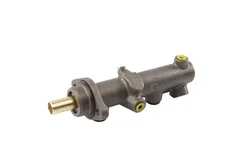Understanding the Role of the Brake Master Cylinder in Your Vehicle
2024-10-14
The brake system is one of the most crucial safety components in any vehicle. Among the various parts involved, the brake master cylinder plays a vital role in ensuring you can stop your vehicle safely. But what exactly does it do? Let’s explore its function and why it’s essential for your driving safety.
What is a Brake Master Cylinder?
The brake master cylinder is a component in the hydraulic braking system responsible for generating hydraulic pressure. When you press the brake pedal, the master cylinder converts the mechanical force of your foot into hydraulic force, which then travels through the brake lines to apply pressure on the brake calipers or drum brakes.
How Does It Work?
1. Brake Pedal Pressed
When you press the brake pedal, it pushes a piston inside the master cylinder.
2. Hydraulic Fluid Transfer
The movement of the piston creates pressure in the hydraulic fluid, which travels through the brake lines to each wheel’s brakes.
3. Braking at Wheels
This pressure forces the brake pads or shoes against the rotors or drums, slowing down or stopping the vehicle.
Components of a Brake Master Cylinder
- Reservoir: Holds brake fluid, ensuring there’s enough supply for the hydraulic system.
- Piston Assembly: Contains one or two pistons that generate the hydraulic pressure.
- Seals: Prevent fluid leaks, ensuring optimal pressure.
- Ports: Allow brake fluid to move from the reservoir into the braking system.
Why is the Brake Master Cylinder Important?
The brake master cylinder is critical because it serves as the starting point of your vehicle’s braking force. Any failure in this component could result in reduced braking performance or, in the worst-case scenario, complete brake failure.
Symptoms of a Faulty Brake Master Cylinder
1. Soft or Spongy Brake Pedal
A soft pedal may indicate that the master cylinder is leaking internally.
2. Brake Warning Light
A drop in brake fluid levels can trigger the warning light, hinting at a master cylinder issue.
3. Brake Fluid Leaks
Visible leaks around the master cylinder can cause reduced hydraulic pressure.
4. Inconsistent Braking
If the brakes feel inconsistent, the master cylinder might have internal leaks.
Conclusion
A properly functioning brake master cylinder is essential for your safety on the road. Regular inspection and maintenance can prevent brake failure and ensure smooth, safe braking. If you notice any issues with your braking system, it’s best to have it checked immediately by a professional.



